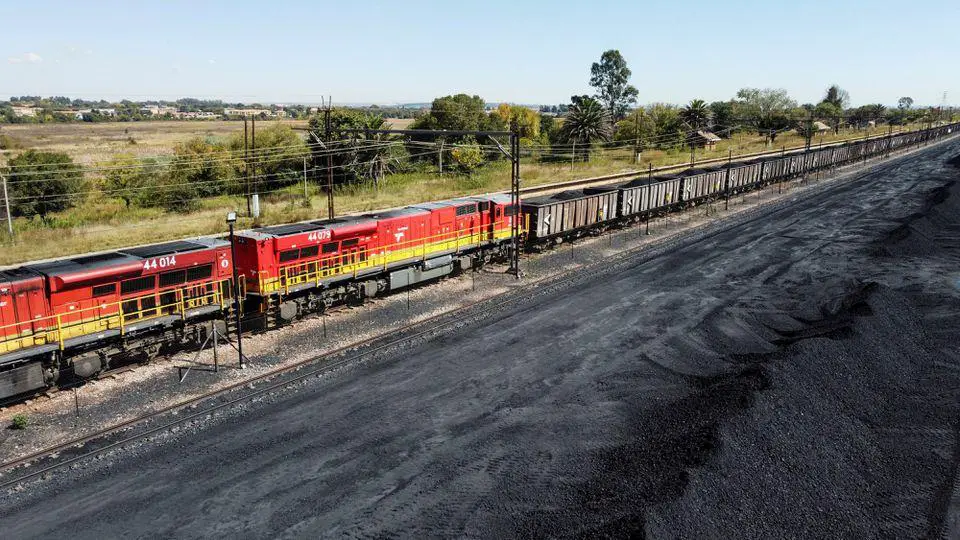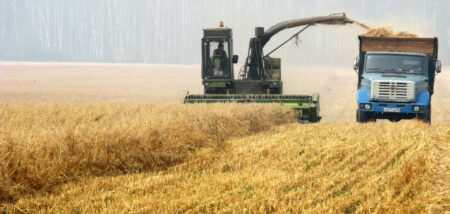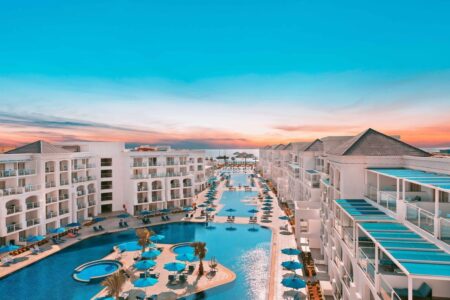- South Africa and Botswana have agreed to fund the improvement and extension of rail links between the countries in a bid to boost trade and better connect Botswana to export markets
- The rail revamp is expected to enable heavy haul trains to travel from Botswana to South Africa’s ports of Richards Bay and Durban
- Botswana Railways previously signed a related agreement with South African rail operator Spoornet in 2007
Railways in Southern Africa constitute one of the most integrated networks linking some 12 mainland SADC countries, with a route network of more than 22,000 kilometres.
Around the 1970s, railways carried most of the internal, exports and imports amounting to about 250 million tones, with the railway market share exceeding the 50% mark, and enjoyed recognized levels of efficiencies.
Whilst the railways had been reliable forms of transportation for both passengers and goods for decades, on a selective basis, several challenges seemed to have emerged, among them, declining performance in certain areas, the declining state of infrastructure, massive retrenchments, reduced business cooperation amongst railways in certain areas, and reduced frequencies of passenger services.
Following the aforementioned performance, and financed viability challenges of railways, South Africa and Botswana have agreed to fund the improvement and extension of rail links between the countries in a bid to boost trade and better connect Botswana to export markets, South African state-owned logistics firm Transnet said last week.
Transnet Freight Rail (TFR) will collaborate with Botswana Rail (BR) to fix parts of the 126 km rail line between Swartruggens, in South Africa’s North West province, and Mafikeng, on the border with Botswana, helping South Africa’s landlocked northern neighbour get its minerals, including thermal coal, to market.
According to an article by Reuters published on August 5, 2022, the rail revamp will enable heavy haul trains to travel from Botswana to South Africa’s ports of Richards Bay and Durban, TFR said. The project aims to be up and running in the next 24 months. However, financial terms were not disclosed.
TFR and BR will also build a rail line from Mamabula in Botswana to Lephalale in South Africa’s Limpopo province.
The two rail companies will work together to fight the “scourge of cable theft and infrastructure vandalism” that is impacting rail services, TFR said, adding this was a “rising problem” in Botswana.
As far as 2007, Botswana Railways signed an agreement with South African rail operator Spoornet. The agreement was expected to yield results in a joint business and harmonization of expectations in terms and allocation of resources. This followed negotiations between the two operators in 2006.
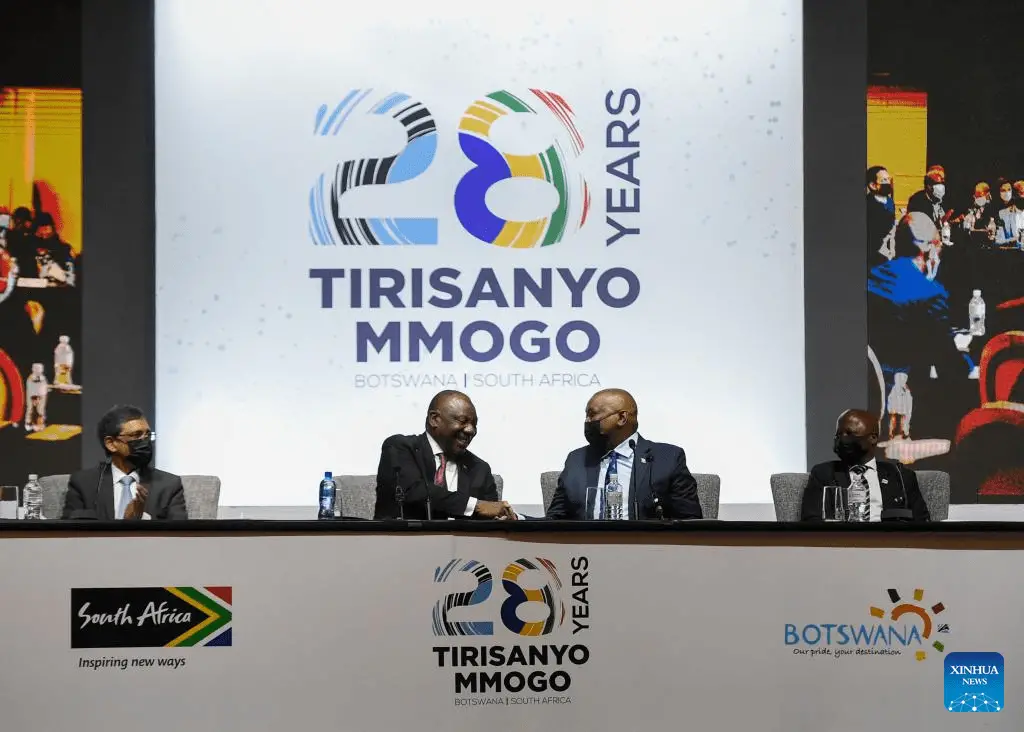
Meanwhile, President Cyril Ramaphosa led successful talks with President Mokgweetsi Masisi at the South Africa – Botswana Business Roundtable at the Gaborone International Convention Centre in the Republic of Botswana.
According to an article by ZAWYA dated August 5, 2022, at South Africa – Botswana Business Round Table chaired by the two Heads of State, business leaders from the two sisterly countries participated in identifying measures to address trade and investment barriers as well as strengthening cooperation between government and private sector in maximizing localization, export promotion efforts, and industrialization.
President Ramaphosa called for accelerated investment in catalytic development projects, particularly in infrastructure which has a positive ripple effect on sectors among them manufacturing, logistics, tourism, and technology.
President Ramaphosa highlighted that the Southern African region has the potential to distinguish itself worldwide as an economic bloc in multiple areas of specialization due to its abundance of natural resources and skills.
The President also implored that women and youth-run businesses in both countries should partake in these value chains to grow the respective economies.
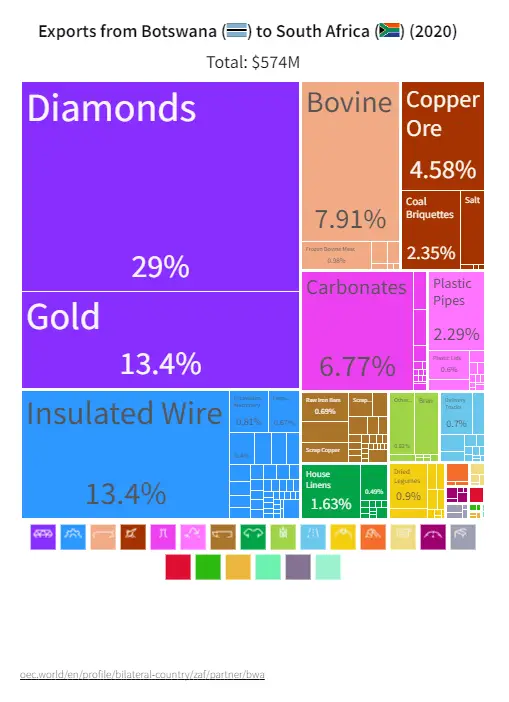
“The trade landscape between Botswana and South Africa remains skewed in favour of the latter and should drastically improve toward stabilization,” said President Masisi.
Figures from Botswana’s statistical agency, Statistics Botswana, indicate that Botswana exported to South Africa goods worth 31 billion pula (about 2.5 billion U.S. dollars) while it imported goods worth 210 billion pula between 2017 and 2021.
On average, Masisi said Botswana imports 42 billion pula while exporting only 6 billion pula worth of goods per annum.
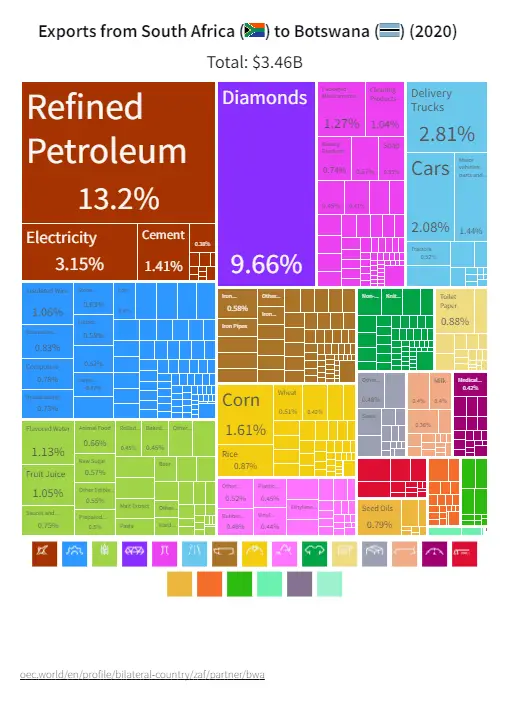
“This needs to be reversed,” said Masisi, adding that increasing exports to South Africa will result in job creation, especially for young people while also driving the much-needed export diversification to support Botswana’s aspirations of an export-led economy.
According to Xinhua, Botswana’s exports to South Africa include diamonds, beef, and soda ash while those Botswana imports include cereals, vehicles, and beverages, among others, he said.
Speaking at the same event, President Cyril Ramaphosa of South Africa said even as the two nations’ bilateral relations have grown over the years, far greater levels of trade and investment between the neighbouring countries need to be seen.
The President also welcomed Botswana’s declaration of opening all border posts to South Africa following the easing of COVID-19 regulations which will speed up trade and economic recovery between the two countries.
According to an article by Alchentron dated May 26, 2018, relations between South Africa and Botswana were formalized with the establishment of representative offices in both countries in 1992. The upgrading of relations to a full diplomatic level came into force on June 22, 1994.
The two countries enjoyed good relations during the presidencies of Thabo Mbeki and Festus Mogae. During the presidencies of Jacob Zuma and Ian Khama relations declined due to differences over African Union appointments, South Africa’s decision to withdraw from the International Criminal Court, and Zimbabwe.
In 2003, South African President, Thabo Mbeki visited Botswana President Festus Mogae. The two countries issued a communique which said the two heads of state reviewed bilateral, regional, and international issues of mutual interest such as the Agreement on the Establishment of a Joint Permanent Commission for Cooperation between Botswana and South Africa.





